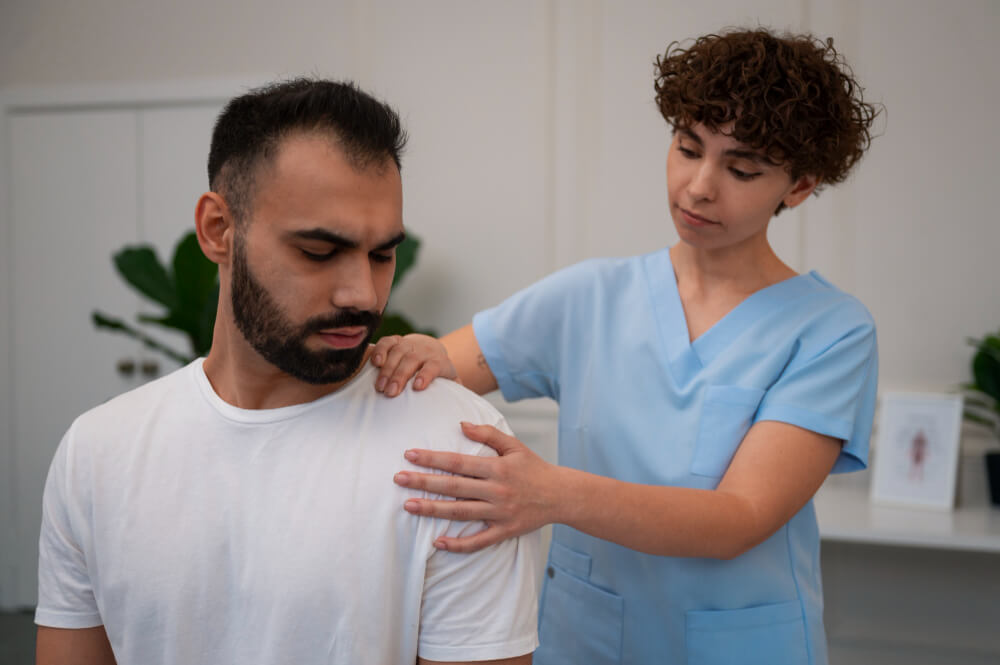Reclaiming Mobility and Freedom: A Guide to Shoulder Pain Treatment
Shoulder pain can be a debilitating condition, significantly impacting your daily activities and overall well-being. From simple tasks like reaching for a shelf to enjoying recreational sports, pain in the shoulder joint can restrict your movement and limit your quality of life. Fortunately, advancements in orthopedic care offer a wide range of treatment options to address shoulder pain and restore mobility. This article delves into the world of shoulder pain, exploring its common causes, various treatment approaches, and the importance of seeking expert care from orthopedic surgeons at specialty care clinics.
Understanding the Complexities of the Shoulder Joint
The shoulder joint is a marvel of engineering, offering a remarkable range of motion and flexibility. It’s a ball-and-socket joint where the upper arm bone (humerus) meets the shoulder blade (scapula). Several muscles, tendons, and ligaments work together to provide stability and movement. However, this complex structure also makes it susceptible to various injuries and conditions that can cause pain.
Common Culprits of Shoulder Pain: Identifying the Cause
Shoulder pain can arise from various factors. Here are some of the most common culprits:
- Rotator Cuff Injuries: The rotator cuff is a group of muscles and tendons that stabilize the shoulder joint. Tears in these structures due to overuse, repetitive motions, or acute injuries can cause significant pain and weakness.
- Arthritis: Degenerative joint disease like osteoarthritis can affect the shoulder joint, leading to pain, stiffness, and inflammation.
- Bursitis: Inflammation of the bursae, the fluid-filled sacs that cushion the shoulder joint, can cause pain and tenderness.
- Impingement Syndrome: When tendons in the shoulder become compressed between the bones, it can lead to pain and difficulty raising the arm.
- Labral Tears: The labrum is a ring of cartilage that surrounds the shoulder socket. Tears in the labrum can cause pain, instability, and clicking sensations in the shoulder.
- Fractures: A fall or direct blow to the shoulder can cause a fracture in the bones of the shoulder joint.
- Dislocations: The ball of the humerus bone dislocating from the socket can be a painful and debilitating injury.
When to Seek Expert Care: Recognizing the Signs
If you experience persistent shoulder pain that interferes with your daily activities or doesn’t improve with home remedies within a few days, it’s crucial to seek medical attention from an orthopedic specialist. Here are some additional signs that warrant a doctor’s visit:
- Pain that worsens at night or interferes with sleep
- Weakness or loss of movement in the shoulder
- Swelling, bruising, or redness around the shoulder joint
- Clicking or popping sounds in the shoulder
- Difficulty performing overhead activities
Treatment Options for Shoulder Pain: A Personalized Approach
The good news is that shoulder pain can be effectively treated in most cases. The specific treatment approach depends on the underlying cause and severity of your pain. Orthopedic surgeons at Specialty Care Clinics will work with you to develop a personalized treatment plan that may include:
- Conservative Measures:
- Rest: Avoiding activities that exacerbate the pain allows for healing and inflammation reduction.
- Physical Therapy: Exercises and stretches prescribed by a physical therapist can help strengthen muscles, improve flexibility, and restore mobility.
- Medication: Pain relievers like over-the-counter medications or prescription drugs can manage pain and inflammation.
- Cortisone Injections: Corticosteroid injections can provide targeted pain relief and reduce inflammation in the shoulder joint.
- Minimally Invasive Surgery: For more severe cases or those where conservative measures haven’t provided adequate relief, minimally invasive surgical techniques offer a valuable option. These procedures utilize smaller incisions, resulting in less tissue damage, faster recovery times, and potentially reduced pain compared to traditional open surgery. Some examples of minimally invasive shoulder surgeries include:
- Arthroscopy: A small camera is inserted into the joint to diagnose the problem and perform repairs using specialized instruments.
- Rotator Cuff Repair: Torn tendons in the rotator cuff can be repaired arthroscopically.
- Shoulder Impingement Surgery: Procedures can address bony spurs or inflamed tissues causing impingement.
The Importance of Seeking Care from Experienced Orthopedic Surgeons:
Choosing an experienced and board-certified orthopedic surgeon specializing in shoulder conditions is paramount. The surgeons at [Clinic Name] possess extensive training and expertise in diagnosing and treating all types of shoulder pain. Here’s what sets our team apart:
- Advanced Diagnostic Techniques: We utilize cutting-edge technology like X-rays, MRI scans, and ultrasound to diagnose the precise cause of your pain.
- Personalized Treatment Plans: We tailor your treatment plan to your specific condition and needs


